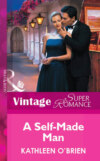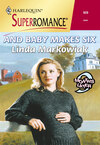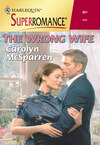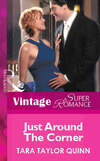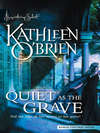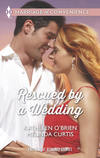Kitabı oku: «A Self-Made Man», sayfa 2
Gwen watched with a barely repressed fury as Lacy led Jennifer away. The nerve of those two self-satisfied snobs! Just exactly what did they think was wrong with being a nanny? Just because neither of them had any children… And as for the Honeydew Café—well, Jennifer was so tightly wrapped, so bony and repressed that people would pay her not to wear Spandex.
Besides, who had appointed them Gwen’s career counselors? She could spend a year laying sewers, if she wanted to. Or she could go be a rodeo clown. It wasn’t anyone’s business but her own.
She didn’t realize she hadn’t released Teddy’s fingers until he protested. “Hey,” he complained, tugging at them. “Ease up!”
She looked over at him, still half-blind with resentment. “Sorry,” she mumbled, trying to hold on to her composure. She felt more like screaming. She felt like yelling down at the departing Lacy that she didn’t give a flying flip what anybody thought of her choices—that her father might have turned Lacy into an obedient little robot-snob, but thank God he hadn’t managed to make one out of his daughter, too.
Teddy must have misinterpreted the intensity in her expression, because his eyes widened, and he made a clumsy move toward her, his lips already pursed for a big, juicy kiss. His awkward lunge pushed them both in front of the spotlight. Suddenly Gwen was truly blinded, this time by hot, white light. She realized that their writhing shadows must be projected on the podium backdrop below, like some X-rated shadow play.
A rather conspicuous method for announcing her arrival in town. The idea definitely had merit, she realized with a rising sense of defiant glee. She stopped struggling and let Teddy wrap his arms around her waist and lower his lips to hers.
Let’s see the Stepwitch handle this. Gwen had observed one indisputable fact through the years: if there was anything that made her frigid little stepmother uncomfortable, it was sex. In fact, she’d bet her trust fund that the widow Morgan, proud possessor of the Serene Gene, hadn’t had a real red-hot firecracker kiss in five years.
Maybe longer.
As Gwen guided Teddy Kilgore’s happily stunned face down toward her collarbone, she recalled what an icy, utterly passive, silently submissive wife Lacy Mayfair had been to Malcolm Morgan.
Heck, maybe ever.
She ran her hands up and down Teddy’s back with exaggerated strokes, knowing it would take broad gestures to attract adequate attention. Teddy responded enthusiastically. “Hot damn,” he murmured against her neck, and then set about taking advantage of his amazing good luck.
He wasn’t a bad kisser, actually. If she hadn’t had other things on her mind, she might even have enjoyed it. Her efforts were rewarded quickly. Within no more than a minute, she heard a few startled sounds from the people right below them. Slowly, as more and more people caught on, a rustle of curiosity moved through the crowd, silencing the normal hum of conversation.
Her fingers buried in Teddy’s black hair, Gwen twisted him a few inches to one side and peered over his shoulder into the audience below. Most of the people were watching the shadow show on the curtains, some smiling with incredulous amusement, some holding back shock with well-manicured, bejeweled fingers.
But one person had already figured it out. One face in the crowd was turned the other way, up toward the loft, up toward the spotlight. Staring straight at the actors.
It was Lacy, of course. Her beautiful face was pale, impassive, as always, but Gwen knew she must be horrified. Echoes came to her from years past. Her father’s voice. Disgusted. Cold.
Control yourself, Gwen, for God’s sake. Haven’t you ever noticed that Lacy never makes a spectacle of herself like that?
Gwen tilted Teddy’s shoulder out of the spotlight’s glare, and tossed her stepmother a broad grin and a wink.
Yeah, she thought wickedly. But I do.
CHAPTER TWO
TWO HOURS LATER, even though the auction was going beautifully, Lacy was done in. The band was still playing “baby” songs—a gimmick that had seemed quite amusing when they’d planned it a month ago.
“Baby, I’m Yours.” “Be My Baby.” “Baby, Come Back.” “Walking My Baby Back Home.” What had she been thinking? And all these paintings of babies—sleeping babies, nursing babies, crying babies, babies cradled lovingly in the arms of doting Madonnas. Suddenly Lacy found the whole thing completely exhausting.
Maybe it was Gwen’s absurdly rebellious arrival. Lacy could only imagine the resentment that had made the young woman put on such a display. When people had begun noticing the sexy silhouettes on the curtains, they had been transfixed—as Gwen had no doubt intended. For a moment Lacy had been stumped. How was such a flagrant piece of bad manners to be handled? Finally, though, she had decided to chuckle, announce that apparently her stepdaughter had joined a theater troupe, and then begin to softly, calmly applaud the performance. Other chuckles had followed, other applause had joined hers, and finally two sheepish young faces had peered down from the loft and grinned.
And, thank heaven, the crisis was averted.
Still, it had taken a lot out of her. Gwen had avoided her the rest of the evening, but Lacy knew a confrontation was inevitable before the night was over. Gwen never came back to the island unless she wanted something, and she never asked nicely. Lacy didn’t blame her. It must be galling to have to ask at all.
And yet, wasn’t it unfair of fate to ask her to handle Adam’s return and Gwen’s bitterness all in one night? Her head was aching, and she longed to go home, crawl under the covers and sleep for a week.
However, as chairman of the fund-raising committee, she couldn’t leave until the last bid was in the box, the last champagne glass drained, the final donor safely out the door. But she simply had to have a moment alone.
She looked around guiltily, like a prisoner scanning the tower watch. For once no one was bearing down on her, requiring a decision or requesting an opinion. Holding her breath, she eased into the small, remote stall at the end of the aisle, an area half hidden by a bank of lush ferns laced with small sparkling white lights. Formerly the stable’s breeding chute, it was too narrow to allow an effective display, so only two or three paintings hung on its padded walls. Most of the guests probably didn’t even know the space was there.
Grateful for the privacy, she pretended to study the largest painting. Ironically, it was one of her late husband’s, which she had donated to the auction somewhat self-consciously, aware that giving away a painting you despised hardly qualified as generosity. She wondered if anyone would buy it. Though it was technically proficient—executed by a fairly well-known Southern artist—she had always hated the thing.
Saturday Morning: Half Past Paradise, it was titled. It showed a sunny summer day in a rustic setting by a river. In the foreground two young lovers lay on a blue-checked picnic blanket, locked in an erotic embrace. In the background, on the corner of the blanket nearest the swiftly flowing water, an infant lay sleeping, utterly forgotten.
Malcolm had bought the painting only a year into their marriage, and had always hung it in a prominent place. Lacy had never told him how she felt about it. Why should she? She hadn’t ever told him how she felt about anything.
“If you want to melt into the woodwork, I’d advise a different dress.” The sheltering curtain of fern fronds rustled, and suddenly Adam Kendall was in the stall, standing right behind her. The white lights crowned his dark head like a twinkling halo. He touched her sleeve, his fingers deeply tanned against the blue silk. “Something less conspicuous. This is the uniform of a player, I’m afraid. Not a bench warmer.”
She looked at him, his broad shoulders effectively blocking the entrance to the shed, and was suddenly uncomfortably aware that these breeding chutes had originally been designed to prevent reluctant mares from escaping.
She fought down a moment of panic. He had caught her, and that was that. She had always known, deep inside, that this day would come. Once she had longed for it, dreamed of it, imagined it down to the clearest detail. Now she just wanted to get it over with.
“Ten years,” she said musingly, half to herself. “Ten years since we’ve seen each other, and all we can find to talk about is clothes?”
He continued to finger the silk, a small smile playing at one corner of his mouth. “But I thought we were doing quite well. It isn’t easy to find the perfect metaphor, you know. Reading between the lines is a dying art, don’t you think?”
How could she pretend not to understand? And, in a way, he was right. Their clothes really were symbols, weren’t they? His old white-kneed jeans and rust-speckled T-shirt had said poverty, hunger, ambition. This new designer tuxedo said luxury, triumph, complacence. But the ratty old T-shirt had smelled so comfortingly of soap and sunshine, and of him. When she had pulled it off, over his shoulders, over his head, she had always pressed it against her face and inhaled deeply, taking him into her lungs before tossing it aside.
Ten years ago, his unkempt black waves of silky hair had said rebellion, defiance, indifference. This new elegant, sculpted disarray said sex, power, confidence. But those tousled waves had always tumbled toward his eyes as he lowered himself over her, dipping his head to her breast. The locks had feathered her skin as he kissed her.
For a long moment she simply studied him, listening to everything his new persona had to tell her, from his squared shoulders to his gleaming cuff links. From his smile to his suntan. From his perfectly knotted tie to his arrogantly arched eyebrow.
But what about that scar? Just below his left eye a tiny line glistened, as if someone had traced the high curve of his cheekbone with a thin silver pencil. Or a knife blade. Where had it come from? What did it say? She stared at the scar, realizing that it was the only imperfection he retained. The only proof that the ten years without her hadn’t been an unbroken string of success and laughter, of wealth and women and satisfied abundance.
“When did you get that scar?” She raised her gaze to his, wondering why, of all the questions she had stockpiled during a decade of silence, that was the only one she could bring herself to speak.
“Years ago. There was an explosion. About a hundred inch-long pieces of glass tried to carve their initials on my face.” His voice was mild and expressionless, as if he were discussing the weather. “One of them did a pretty good job.”
“Was it an accident at work?” She fought the urge to touch the silver scar, to test its depth, to measure with her trembling finger how close it had come to his eye. “At the refinery? I remember that the job was supposed to be dangerous….”
He smiled shallowly. “They don’t ordinarily give you hazard pay unless there’s some hazard involved. And that’s why I took the job, wasn’t it? The idea, if I recall correctly, was to make my fortune as quickly as possible so that I could get back home.” He shrugged. “It seemed rather urgent at the time.”
She swallowed hard, remembering all too well. “But an explosion… You could have been—”
“What? Killed? Too messy for you, Mrs. Morgan? Perhaps you think I should have married my fortune instead.” His voice was low, his eyes speculative as he pretended to consider the idea. “I suppose that would have been simpler. But call me old-fashioned. I’ve always thought money you actually work for sits a little easier in your pocket.”
She felt herself flushing. “Adam…” She couldn’t meet his gaze. “Adam, don’t—”
He laughed softly. “Poor Lacy. You don’t care for this subject, either? All right, then, let’s see… We’ve eliminated the topic of our clothes. The past is off-limits. The truth is forbidden.” He leaned against the teasing wall and scanned the small chute. “Well, I hear you’re an art expert. We could talk about this horrible painting.”
“Adam.” She was shaking her head, trying to take a deep, calming breath. She wanted desperately to leave the stall, but he was blocking her exit. The front of the chute had a panic clutch, but it was on the other side, where breeders could quickly release a mare that was in danger. Ironic, she thought, that an unhappy horse could escape this chute, but a trapped woman could not.
He had come up very close behind her, and was looking at the painting over her shoulder. “Half Past Paradise… Interesting title,” he said, putting his hands on her shoulders, turning her around to face the picture as if she were a doll, his to pose at will. “Don’t tell me you like it. I won’t believe you.”
She willed herself to go numb, to ignore his strong fingers against her bare shoulders. She was not going to make a fool of herself. And she wasn’t going to let him presume to tell her what she thought, what she felt.
“It’s a very good painting, actually,” she heard herself say in her best art-school voice. She summoned the vocabulary of the tour guide. “It’s one of Franklin’s best works. The composition is sophisticated, with strong movement in the lines, the river running left to right, the bodies lined up at a forty-five-degree angle. The asymmetry suggests dissonance, confusion, danger.”
“Baloney. Pure textbook baloney,” he observed, calmly unimpressed. “I’m sorry, Lacy, but I know your taste too well. I know you too well. You hate this picture. It may have technical sophistication, but that’s not what you look for in art, or in life. You want vitality, passion, heart—and this garbage has none of those things. You’d never hang it where you’d actually have to look at it.”
Furious, she edged out of his grip, swiveled and met his smug gaze, lifting her chin. “Perhaps you don’t know me as well as you’d like to believe, Adam. Things change a lot in ten years. People change.”
He shook his head. “Not that much.”
She laughed. “Oh, yes, Adam, that much and more. You see, that painting belonged to my husband. It hung in my home, over our library mantel, in a place of honor. I’ve looked at it every day since I was married. Every single day for ten years.”
For a moment he didn’t respond, and she took advantage of his silent surprise to slip past him. She was almost free when his hand caught her wrist.
She turned and glared at him icily, willing him to release her. It was a look that had intimidated many an importunate admirer.
But of course it didn’t work on him. Not on Adam.
“I’m beginning to wonder,” he said quietly, studying her face, “if I might have been wrong.”
“Wrong about what? That I’ve changed? Yes, Adam, you were quite wrong about that. Now, if you’ll excuse me—”
“No,” he said, a half smile curling his upper lip, and a sardonic angle high on one dark eyebrow. “I mean I may have been wrong about married money.” He looked down at her huge, vulgar, square-cut diamond, tilting her hand so that it flashed in the light. “It’s quite possible that you had to work much harder for your paycheck than I did.”
GWEN DIDN’T SHOW UP at the house after the party, for which Lacy should have been grateful. But as the long night wore on, Lacy realized that even an argument with her stepdaughter would have been preferable to being alone with her thoughts.
Lacy pounded her pillow for hours, making an inventory of the deadly comebacks she should have used, the perfectly crafted put-downs that would have forced Adam Kendall to choke on his own effrontery. But a fat lot of good they did her now, spoken only to Hamlet, her silver Persian kitten who blinked at her angry tone, curled up in the crook of her knee, and fell asleep halfway through her best line.
Stroking Hamlet’s silken fur and envying him his easy slumber, she struggled for hours with frustration, confusion and something that felt like fear. How long was Adam planning to stay? And how much damage could he do to her peace of mind before he grew tired of the game and jetted away again to parts unknown?
She buried her face in her pillow. Oh, God, what was she going to do? The question drummed against her mind relentlessly—but she found no answer in the desperate darkness.
When dawn finally crawled in through the window, Lacy unwound herself from the knotted covers with relief. She hated this feeling—and she despised the wreck she saw in her mirror, all puffy eyes and tangled hair.
Suddenly her pride came marching in belatedly to her rescue. This wasn’t Lacy Morgan. This looked more like pitiful Lacy Mayfair. And she wouldn’t stand for it—she had fought too hard to banish that lonely little girl. Lacy Mayfair had foolishly allowed Adam to have the final word last night. But this morning belonged to Mrs. Malcolm Morgan.
So…what was she going to do? She was going to do what she had always done. She was going to protect herself and survive. She was going to take the lessons she’d learned over the past ten years and put them to work. Lessons about courage, about compartmentalizing, about burying unwanted emotions, about squaring her shoulders and soldiering on. She was going to wrap herself in indifference so thick even Adam Kendall’s blue eyes couldn’t pierce it, so cold even his hot fingers couldn’t melt it.
In fact, she told her reflection sternly, for the first time in ten years she was now completely free. A long-dreaded storm had finally broken. After ten years of seeing Adam only in dreams, she had been forced to talk to him, look into his eyes, feel his fingers on her skin.
It had hurt, but she had survived. Fate had fired its last bullet at her—and it had missed. There was nothing left to fear.
Two hours later, when she arrived at the hospital, a cucumber lotion had soothed her eyes, a small silver clip snugged her hair neatly into its accustomed French twist, and a crisp ice-blue suit completed the picture of a calm working professional.
No more angst. Now it was simply back to business. Raising money, putting out office brush fires, posing with happy parents who wanted to remember their friends on the staff of Pringle Island General Hospital. These were all things that the competent Lacy Morgan, director of community relations, could do in her sleep.
Lacy smiled at the family who waited in front of her now. She had just taken their picture—proud father, ecstatic mother, robustly wriggling baby girl. Yes, she thought, handing the daddy his camera. This was better. Much better.
“Take the baby, would you please, Mrs. Morgan? We want a picture of you two together. We wouldn’t ever have made it though all this without you.”
With pleasure, Lacy accepted the beautiful, pink-faced infant, who was finally going home after three weeks under ultraviolet lights in the nursery. It had been touch-and-go, but this little one was a fighter. Lacy whispered soft nothings and let the amazingly delicate fingers wrap around her thumb.
Soon, when the hospital had its own neonatal unit, these success stories would be commonplace. Small miracles on a daily basis, and she would be a part of that. A worthwhile life, surely. Even if none of the miracles were her own….
The father’s enthusiasm knew no bounds, and he kept the flash popping even after Lacy’s eyes were half-blind with red after-images, even after his tiny daughter had begun to wail in bored protest.
“Mr. Rosterman, perhaps it’s time to take—”
“Lacy?” Kara Karlin’s worried voice broke in. “Can I speak to you a moment?”
Lacy looked over toward the maternity ward door, and saw Kara’s wrinkled brow and pursed lips. She knew that look. Something was wrong. Shifting the baby to her shoulder, where her cries subsided slightly, Lacy left the parents struggling to get a new roll of film into their camera and moved to where Kara stood wringing her hands.
“Lacy, I’m so sorry. I really hate to bother you, but the most awful thing has happened.”
Lacy smiled. Though Kara was nearly fifty and the seasoned mother of four, she lived and breathed superlatives like a teenager. Everything that happened to her was the most something—most terrible, most wonderful, most horrifying, most exciting. All peaks and valleys. Lacy, who had carefully tethered her own psyche to a flat, uneventful plain for years, realized that she sometimes took a vicarious pleasure in watching Kara roller-coaster through her days.
“Surely not the most awful,” Lacy teased, patting the baby’s back softly. “The Most Awful thing happened yesterday, didn’t it, when the caterer brought the wrong hors d’oeuvres to the auction? And yet somehow we survived.” She swayed slightly as she talked, creating a gentle rocking motion. The baby began to suck her fingers placidly, and the quiet was blissful. “We even managed to raise a quarter of a million for the neonatal unit.”
Kara scowled. “Laugh if you like, but if old Mr. Terwilligan had touched one of those seafood canapes, his throat would have swelled up like a blow-fish.” She brushed her damp, graying hair back from her temples. “And besides, this is worse. You won’t believe it, Lacy. The birthday clown is sick. We haven’t anyone to do the basket thing.”
Now that was a problem. The entire pediatric ward was practically holding its breath, awaiting the clown visitation and the attendant shower of toys and candy from his huge green basket. To disappoint the children would be unthinkable.
And therefore Lacy simply wouldn’t let it happen. “We’ll have to find a replacement,” she said calmly, her mind scanning the possibilities like a computer. “Is Leo working today?” Kara shook her head mournfully. “Bart?” Another negative. “Roger?”
“We don’t have a single man in the community relations department today. Oh, what are we going to do? The kids are so excited. Ronny Harbaugh was up all night.”
“Now, Kara, don’t panic.” Lacy concentrated on slowing her breath, lowering her voice, communicating serenity both to the suddenly restless baby and to the older woman, who seemed about to burst into tears.
Rotating the baby to her other shoulder, she studied the possibilities. “No men at all. What about a woman, then?”
Kara looked blank. “But we always use a man. The costume is huge. The eyes are so high—”
“Then we need a tall woman.” Lacy scanned Kara’s trim five-feet-ten inches. “What about you?”
Kara looked stunned, confused by this departure from tradition, terrified at the sudden responsibility. “Oh, I couldn’t. I’ve never… We’ve never… I just couldn’t.” But she wanted to. Lacy could see a tremulous hope in her eyes. “Could I?”
“Of course you can,” Lacy said steadily, putting her free hand on the other woman’s shoulder. “The kids all love you. You’ll be wonderful.”
“But I can’t.” Kara braided her fingers anxiously. “Oh, my goodness, the newsletter! And I was just about to—”
“It doesn’t matter. I’ll help you get the newsletter sent out. Whatever else there is can wait.”
“No, really, this can’t.” Groaning softly, Kara gnawed on one already-tortured fingernail. “Oh, this is the worst luck! I was just about to give a tour—”
“I’ll take the tour.” Lacy put a little steel in her voice, though she still smiled encouragingly. “Now for heaven’s sake, Kara, stop worrying and start dispensing birthday presents before Ronny Harbaugh starts a riot in the pediatric ward.”
Kara’s answering smile was equal parts gratitude and anxiety. “Oh… All right, I will, then!” She bustled toward the hallway, turning back at the last minute, her face lit with a new inspiration. “You know, you probably should conduct this tour, anyhow, since you’re the director. He’s not just any investor. He’s the type who’d expect the red carpet treatment, isn’t he?”
Lacy’s stomach went suddenly cold. She gripped the infant more carefully as she felt the room take a quick, violent tilt and right itself in the blink of an eye. Aware of the baby’s parents watching her with a sudden, instinctive anxiety, she fought the urge to follow Kara down the hall.
“He?” She spoke loudly enough to reach the bank of elevators where Kara waited. Her voice sounded normal, thank God. “Who?”
But she knew. She knew even before Kara stepped into the waiting elevator and turned with the name on her lips. “Only the most gorgeous man on Pringle Island, you lucky thing,” Kara called back. “Only that hunky Adam Kendall.”
HE HAD TO GIVE HER CREDIT. The lady had guts.
Adam raised one eyebrow as he watched Lacy coming toward him, her posture erect, her chin high and set. Even though Kara Karlin had popped in about half an hour ago to promise that Lacy would be arriving soon, still Adam would have bet his left cuff link that she’d never show. The tour would be quietly foisted off onto some underling.
He had assumed, in fact, that it was Lacy’s search for a suitable underling that had kept him cooling his heels here in the waiting room of the community relations department. Not that he’d minded—the room was designed for comfort. The chairs opened roomy, inviting arms to visitors. Peach pillows as soft as upholstered clouds tumbled across the sofa. Cheerful apricot artwork smiled from behind the desk. Gentle, indirect lighting spread a buttery glow over every wall.
The room positively oozed warmth. Lacy Morgan, however, stopping now in the doorway to take a deep breath, did not.
Dressed in a knife-slim, glacial-blue suit, her long, thick hair pulled back into a cruel, shining knot at the nape of her pale neck, she affected the room like a blast of refrigeration. She didn’t hurry, even after she saw him sitting there. She smoothed her sleeve carefully, then touched the top button of her collar, which was high, slightly Oriental, and clearly in no danger of slipping open—now or ever. Then she moved to her desk, a study in graceful efficiency. Her slim heels clicked against the wood flooring with a sound that reminded him of ice falling into an empty glass.
She fingered a few papers pointlessly, then looked up, gazing at him with a cold calm. “Kara tells me she promised you a tour,” she said politely. “I’m sorry to have kept you waiting.”
“Really.” He smiled. “Are you sure?”
She obviously hadn’t expected that. A faint line marred the snowy placidity of her forehead before she caught herself and smoothed it away. “Sure of what?”
“That you’re sorry to have kept me waiting.” He hitched one leg over the other and watched her from the comfortable embrace of the armchair. “After last night, I thought perhaps you might have welcomed the opportunity to…put me in my place.”
“Your place, Adam?” She shook her head. “I wouldn’t presume to know where your place might be.”
“Well,” he murmured. “Under your thumb, perhaps?”
She laughed, a brittle sound that once again reminded him of ice cubes tinkling against crystal. “Actually, the last time I remember thinking about where you should go, it was somewhere considerably farther south. And somewhat warmer.”
“Oh?” He smiled and let his gaze travel slowly south across her body. He couldn’t help himself. He knew what she meant, of course—that he belonged in the lowest level of Hell. But she wasn’t very good at this game, was she? She had thrust, but the effort had left her exposed.
In the space of two hot, blinking seconds, she knew how it had sounded. Her eyes widened, and her fingers tightened on the papers they held.
He didn’t speak. He didn’t have to. He waited for the signature cherry-red circles to bloom in her cheeks. She had always been a blusher. She had blushed when Mrs. Bickens called on her in Calculus, when Adam’s fellow construction workers whistled at her as she picked him up after the late shift, when her aunt scolded her for coming in beyond the stroke of midnight….
And, with an intoxicating innocence that had sent quakes through his entire system, she had blushed in his arms when he undressed her. Though they had been alone in the melting summer darkness, it had taken a dozen murmuring kisses to coax her fingers away from her burning cheeks.
But, to his surprise, she didn’t blush now. If anything, her strangely immobile face, ivory under its weight of dark hair, grew even more pale.
She stared at him a long moment and then, slowly, she came around the desk and leaned against the corner. She adjusted her skirt with graceful hands. A wink of silver at her wrist showed beneath her cuff and a scallop of white lace retreated obediently under her hem.
The shift brought their knees together, separated by no more than a sliver of an inch. It was deliberate—he could see the challenge in her steady gaze. She was completely unaffected, she was assuring him, by both his words and his body.
“Perhaps we’d better get something straight,” she said in a voice that was commendably even, if not quite natural. “Touring potential investors is part of my job. Don’t flatter yourself that I would let anything you did in the past—last night or ten years ago—keep me from raising money for this hospital.”
He stared back at her, realizing that suddenly, absurdly, he was angry. Angry at that marble-statue face, at that automaton voice, at those graceful hands that no longer trembled. What a waste. What a criminal waste of sweet fire and flesh and blue-moonlight blushes.
What the hell had she turned herself into? And, more to the point, why did he give a damn?
“Don’t worry, Lacy,” he said with another cold grin, this one curving to within an inch of rudeness. “I know you better than to believe you’d ever let anything come between you and a man’s wallet.”
Had he still been hoping for a reaction? If so, she had bested him again. She merely nodded and returned his smile.
